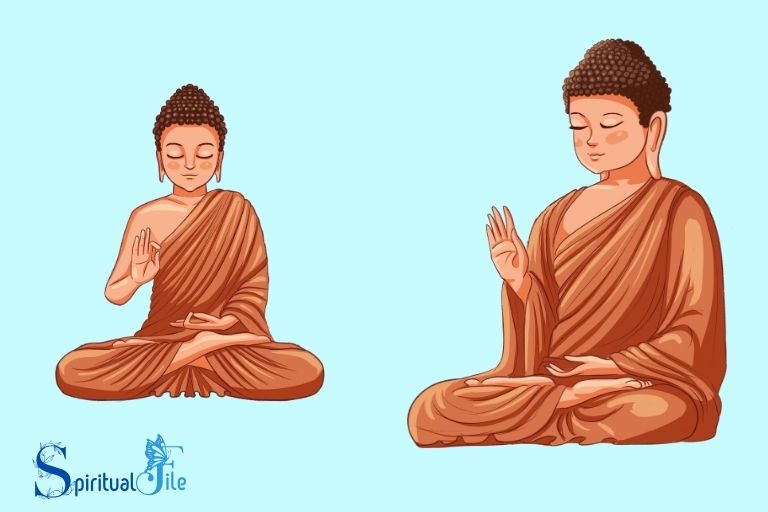Example of Spiritual Philosophy: Principles!
Spiritual philosophy is a broad concept that covers various philosophies, principles, and belief systems that people use to understand and make sense of the universe and their own personal existence.
Spirituality, therefore, is often connected to themes like purpose, the meaning of life, and self-discovery.
Spiritual philosophy enables individuals to question the purpose of their existence, the universe, and everything in it. It often involves a belief in a higher power or divinity, and the principles it encompasses can vary greatly between different cultures and individuals.
Spiritual philosophies often emphasise the importance of personal growth and understanding one’s place in the wider universe.
In essence, spiritual philosophy explores our relationship with the divine and our purpose in the universe. It allows us to navigate our life’s journey with a sense of understanding and meaning.
Whether it’s understanding our place in the universe, pursuing personal growth, or seeking connections with a higher power, spiritual philosophy offers a framework to guide us.
7 Philosophy’s Spiritual Examples
| Philosophy | Origin | Basic Beliefs |
|---|---|---|
| Buddhism | India | Life is suffering caused by desire, which can be eliminated by following the Eightfold Path. |
| Hinduism | India | Belief in a cycle of birth, death, and rebirth, governed by Karma. The ultimate goal is Moksha (liberation). |
| Taoism | China | Living in harmony with the Tao (the way), which governs the universe. |
| Sufism | Middle East | Inner, mystical dimension of Islam, which focuses on direct knowledge of the divine. |
| Kabbalah | Israel | Mystical interpretation of the Bible, direct communication with God. |
| Zen Buddhism | Japan | Emphasis on meditation, mindfulness, and living in the moment. |
| Confucianism | China | Belief in the importance of moral order, respect for authority, and harmony in relationships. |
Key Takeaway

Five Facts About: Examples of Spiritual Philosophy
Exploring The Meaning And Essence
Exploring the profound meaning and essential concepts of spiritual philosophy, this enlightening example delves into the depths of our existential journey, offering insight into the interconnectedness of the mind, body, and spirit.
Discover the transformative power of self-awareness and embrace the spiritual essence within.
Spiritual Philosophy In Daily Life:
In the hustle and bustle of our daily lives, it’s easy to lose sight of the bigger picture and forget about our spiritual journey.
However, integrating spiritual philosophy into our everyday experiences is crucial for personal growth and fulfillment.
By exploring the meaning and essence of spiritual philosophy, we can embark on a transformative and enlightening path.
Let’s dive into how spiritual philosophy manifests itself in our daily lives:
Cultivating Mindfulness:
- Embracing the present moment: Being fully present in each moment allows us to experience life deeply and appreciate its beauty.
- Practicing gratitude: Expressing gratitude for even the smallest blessings brings us closer to a state of contentment and inner peace.
- Developing self-awareness: Understanding our thoughts, emotions, and actions enables us to make conscious choices aligned with our spiritual values.
Nurturing Compassion And Connection:
- Showing empathy: Recognizing and understanding the experiences and emotions of others fosters compassion and connection.
- Cultivating forgiveness: Letting go of resentment and forgiving ourselves and others promotes emotional healing and harmony.
- Encouraging unity: Recognizing the interconnectedness of all beings helps us transcend boundaries and embrace a more inclusive worldview.
Seeking Purpose And Meaning:
- Reflecting on life’s purpose: Exploring our passions, values, and aspirations allows us to lead a more purpose-driven life.
- Embracing personal growth: Committing ourselves to continuous learning and self-improvement leads to a deeper understanding of ourselves and the world around us.
- Finding meaning in challenges: Viewing challenges as opportunities for growth and transformation helps us navigate life’s obstacles with resilience and grace.
Practicing Rituals And Self-Care:
- Engaging in spiritual practices: Routines such as meditation, prayer, or yoga provide a sense of grounding and connection to higher realms.
- Prioritizing self-care: Nurturing our physical, emotional, and spiritual well-being allows us to show up fully in our lives and serve others with authenticity.
By incorporating these aspects of spiritual philosophy into our daily lives, we embark on a profound journey of self-discovery, inner peace, and personal growth.
Spiritual philosophy serves as a compass, guiding us towards a more meaningful and fulfilling existence. Let us embrace the essence of spiritual philosophy and infuse our lives with its transformative power.
Historical Perspective
Historical perspective offers an example of spiritual philosophy, providing insights into the beliefs and practices of ancient civilizations.
This ancient wisdom can inspire and guide us in our modern lives, offering a deeper understanding of our spiritual journey.
Origins And Evolution Of Spiritual Philosophy:
Spiritual philosophy traces its roots back to ancient civilizations, where humans sought deeper understanding and connection with the divine.
Over centuries, this transcendent pursuit has evolved, shaped by influential thinkers and spiritual philosophers from across the globe.
Here is a brief overview of the origins and evolution of spiritual philosophy:
The indus valley civilization (2600–1900 bce): The roots of spiritual philosophy can be traced back to the ancient indus valley civilization. The people of this civilization had a deep reverence for nature and believed in the existence of a spiritual realm.
Ancient greek philosophy (6th century bce onwards): Greek philosophers played a vital role in the development of spiritual philosophy. Figures like socrates, plato, and aristotle explored philosophical inquiries into the nature of existence, the soul, and ethical values.
Eastern philosophies (e.g., hinduism, buddhism, and confucianism): These philosophies emphasized spiritual enlightenment, karma, and the interconnectedness of all beings. They offered guidance on leading a virtuous life and achieving spiritual liberation.
Monotheistic religions (judaism, christianity, and islam): Spiritual philosophy in monotheistic religions revolves around the belief in a single, omnipotent deity.
These religions offer moral principles, sacred texts, and rituals to guide followers on their spiritual journey.
Renaissance philosophers (15th–17th century): During the renaissance, philosophers like rené descartes, francis bacon, and thomas hobbes explored the relationship between spirituality, reason, and the empirical world.
They laid the groundwork for a more secular approach to philosophical inquiry.
Influential Spiritual Philosophers Throughout History:
Throughout history, numerous spiritual philosophers have left a lasting impact on the development of spiritual philosophy.
Here are some notable figures and their contributions:
- Laozi (6th century bce): The founder of daoism, laozi emphasized the importance of the dao (the way) and advocated for a return to a natural and balanced way of life.
- Siddhartha gautama (563–483 bce): Known as the buddha, gautama’s teachings formed the foundation of buddhism. His insights into suffering, impermanence, and the path to enlightenment continue to inspire seekers of spiritual truth.
- Plotinus (205–270 ce): A prominent figure in neoplatonism, plotinus combined elements of platonic philosophy with mystical ideas. He believed in the unity of all existence and the existence of a transcendent realm.
- Rumi (1207–1273): A renowned persian poet and sufi mystic, rumi’s works explored themes of divine love, spirituality, and the quest for union with the divine.
- Kabbalistic philosophers (13th–16th century): Jewish mystics and philosophers, such as moses de león and isaac luria, delved into the esoteric teachings of kabbalah, seeking to unravel the mysteries of the universe and the divine.
- Ralph waldo emerson (1803–1882): A key figure in transcendentalism, emerson emphasized individual intuition, self-reliance, and a deep connection with nature as means to spiritual growth.
- Paramahansa yogananda (1893–1952): Yogananda brought the teachings of yoga and meditation to the west, emphasizing the unity of all religions and the attainment of self-realization through spiritual practices.
These are just a few examples of the many influential spiritual philosophers who have shaped the evolution of spiritual philosophy throughout history.
Each of their unique perspectives and insights continues to inspire individuals on their spiritual journeys today.
Interconnectedness Of All Beings
In exploring the example of spiritual philosophy, one common theme is the interconnectedness of all beings.
This belief emphasizes that every individual is part of a larger collective, highlighting the profound interdependence and unity among all living entities.
Unity in diversity:
The concept of unity in diversity emphasizes the interconnectedness of all beings, highlighting that even with our differences, we are part of a larger whole.
This philosophy recognizes and celebrates the unique qualities and perspectives each individual brings, while also acknowledging our shared experiences.
Despite our diverse backgrounds, beliefs, and experiences, we are all interconnected in a profound way. This interconnectedness illustrates that no being exists in isolation; rather, we are all part of a complex web of relationships and connections.
Just as the branches of a tree are part of the same organism, we are all part of the same cosmic existence. This philosophy encourages us to recognize and honor the unity that underlies our diversity, fostering harmony and understanding among all beings.
Unity in diversity teaches us to embrace and celebrate the richness of human experience, promoting inclusivity and respect for all individuals. It encourages us to transcend barriers of race, nationality, religion, and culture, emphasizing our shared humanity.
Oneness and collective consciousness:
Oneness is the belief that there is an inherent interconnectedness and interdependence that binds all beings together.
It is the realization that we are all part of a greater whole, and our thoughts, actions, and energy impact not only ourselves but also the collective consciousness.
At the core of oneness is the understanding that we are not separate entities but rather interconnected aspects of a larger universal consciousness.
This interconnectedness implies that what we do to others, we do to ourselves, and the well-being of one is intricately linked to the well-being of all.
Seeking Inner Truth And Wisdom
Embarking on a spiritual journey of seeking inner truth and wisdom offers profound insights into the example of spiritual philosophy, enabling individuals to explore the depths of their existence and find enlightenment.
Such exploration allows for a deeper understanding of life’s purpose and connection to the divine.
Seeking inner truth and wisdom is an essential aspect of spiritual philosophy. It involves self-reflection, introspection, and the practice of meditation and mindfulness.
By engaging in these practices, individuals can explore their inner selves, discover their purpose, and achieve a deeper level of understanding about their existence.
Here, we delve into the significance of self-reflection and introspection, as well as the role of meditation and mindfulness in the pursuit of inner truth and wisdom.
Self-Reflection And Introspection:
Self-reflection and introspection are key practices in the journey toward inner truth and wisdom. By taking the time to look within ourselves, we can gain insight into our thoughts, emotions, and actions.
Here are some ways in which self-reflection and introspection contribute to this process:
- Identifying patterns and behaviors: Self-reflection allows us to recognize patterns and behaviors that may hinder our personal growth. By observing ourselves objectively, we can pinpoint areas for improvement and make positive changes.
- Understanding emotions: Through introspection, we can gain a deeper understanding of our emotions. This enables us to manage and express them in a healthy and constructive way, fostering emotional well-being.
- Gaining clarity: Self-reflection provides an opportunity to clarify our values, beliefs, and goals. By understanding our inner desires and aspirations, we can align our actions with our true selves, leading to a more purposeful life.
The Role Of Meditation And Mindfulness:
Meditation and mindfulness serve as powerful tools in the pursuit of inner truth and wisdom. They facilitate a connection with our inner selves and help in cultivating awareness and presence.
Here is how meditation and mindfulness contribute to this journey:
Cultivating stillness and silence: Through meditation, we create a space of stillness and silence within ourselves. In this state, we can observe our thoughts, emotions, and physical sensations without judgment, gaining insight into our inner workings.
Fostering awareness: Mindfulness practices involve directing our attention to the present moment.
By intentionally focusing on our senses and experiences, we develop a heightened awareness of ourselves and the world around us. This awareness aids in discovering our inner truth.
Accessing inner wisdom: Meditation and mindfulness provide a gateway to accessing our inner wisdom.
By quieting the mind and attuning to our intuition, we can tap into a deeper knowing that goes beyond logical thinking. This inner wisdom guides us on our spiritual journey.
By engaging in self-reflection, introspection, meditation, and mindfulness, individuals embark on a path of seeking inner truth and wisdom.
These practices allow us to uncover our authentic selves, cultivate self-awareness, and gain a deeper understanding of our purpose and existence. Embracing this journey can lead to personal growth, transformation, and a more fulfilling life.
Embracing Transcendence
Discover the essence of spiritual philosophy through the concept of “embracing transcendence”. This example showcases the journey towards higher consciousness and the exploration of the self beyond the material world.
Embracing transcendence is an essential aspect of spiritual philosophy, as it involves rising above the limitations of material existence and expanding our consciousness towards the realm of the spiritual.
It is a profound journey of seeking higher understanding, enlightenment, and connection with a higher power.
Let’s delve deeper into this concept and explore the ways in which we can embrace transcendence.
Transcending Material Existence:
Embracing the impermanence of the material world: Recognize that everything in the material world is temporary and constantly changing.
By accepting this impermanence, we can detach ourselves from material possessions and focus on what truly matters – our inner growth and spiritual development.
Expanding our consciousness: Transcending material existence involves expanding our consciousness beyond the boundaries of our physical reality.
This can be achieved through various practices such as meditation, mindfulness, and deep introspection.
By quieting the mind and connecting with our inner self, we can tap into higher states of consciousness and gain a broader perspective on life.
Letting go of attachments: Transcending material existence also requires letting go of attachments to desires, expectations, and ego-driven identities.
When we detach from these attachments, we free ourselves from the limitations they impose and allow space for spiritual growth and transformation.
Connecting with the divine: Embracing transcendence involves recognizing the presence of a higher power or divine energy that exists beyond the material realm.
Through prayer, contemplation, and spiritual practices, we open ourselves up to the guidance and wisdom of the divine, fostering a deeper connection and understanding of our spiritual nature.
Living in alignment with spiritual principles: Transcending material existence goes hand in hand with living a life in alignment with spiritual principles.
Practicing love, compassion, gratitude, and forgiveness helps us transcend the ego’s limitations and cultivate a state of higher consciousness.
Embracing transcendence is a transformative journey that allows us to expand our perception of reality and connect with the deeper aspects of our existence.
By transcending material limitations and embracing the spiritual, we can find meaning, purpose, and profound fulfillment on our path towards enlightenment.
So, let us embark on this journey and discover the wonders that lie beyond the boundaries of material existence.
Finding Purpose And Meaning In Life
Discovering purpose and meaning in life is a fundamental aspect of spiritual philosophy.
By exploring our inner selves and connecting with higher forces, we can align with our true purpose and find fulfillment in our existence.
Embracing spiritual principles allows us to live with intention and live a more meaningful life. Living a purposeful and meaningful life is a quest that many individuals embark on.
It is a journey of self-discovery and inner reflection that allows us to uncover our true calling and align our actions with our values. By finding purpose, we can gain a sense of fulfillment, happiness, and satisfaction in our lives.
In this section, we will explore the concept of finding purpose and meaning in life and how it can positively impact our overall well-being.
Aligning Actions With Values:
- Identifying core values: Begin by reflecting on your personal values and beliefs. What truly matters to you? What principles do you hold dear? Understanding your core values will help you align your actions with what you truly believe in.
- Setting meaningful goals: Define what success means to you based on your values. Set goals that are in line with your beliefs and aspirations. This will give your actions a sense of purpose and direction.
- Making conscious decisions: Pause and reflect before making decisions. Consider whether your choices are in alignment with your values and if they will contribute to your overall sense of purpose and fulfillment.
- Prioritizing time and energy: Allocate your time and energy to activities and relationships that align with your values. By focusing on what truly matters to you, you can create a more fulfilling and purposeful life.
- Embracing growth and learning: Continuously seek opportunities for personal growth and development. By expanding your knowledge and skills, you can further align your actions with your values and enhance your sense of purpose.
- Practicing gratitude: Cultivate a mindset of gratitude and appreciation for the present moment and the opportunities life offers. Acknowledging and expressing gratitude can help you find meaning in everyday experiences.
Remember, finding purpose and meaning is a deeply personal journey. It may take time and self-reflection to uncover your true calling.
Embrace the process and be open to new possibilities. By aligning your actions with your values, you can cultivate a purpose-driven life and experience a greater sense of fulfillment, happiness, and meaning.
Promoting Compassion And Empathy
Promoting compassion and empathy is a spiritual philosophy that fosters understanding and kindness towards others.
It encourages individuals to connect on a deeper level, acknowledging the shared human experience and cultivating a sense of love and compassion for all beings.
Cultivating Empathy And Compassion Towards All Beings
- Develop an understanding of the interconnectedness of all living beings: Recognize that every individual, regardless of their species or background, desires happiness and freedom from suffering.
- Practice active listening: Allow yourself to truly hear and understand others, acknowledging their feelings and perspectives without judgment.
- Expand your perspective: Seek out diverse experiences and learn about different cultures, beliefs, and ways of life. This helps broaden your understanding and cultivate empathy towards others.
- Engage in acts of kindness: Perform small acts of kindness regularly, whether it’s volunteering for a charity, helping someone in need, or simply being there for a friend or family member.
- Show empathy towards yourself: Treat yourself with kindness and compassion, recognizing your own worth and respecting your own needs.
- Practice forgiveness: Let go of grudges and resentments, understanding that forgiveness is not about excusing someone’s actions but freeing yourself from the burden of anger and negativity.
- Develop compassion through meditation: Engage in loving-kindness meditation to cultivate a sense of compassion and empathy towards all beings, including yourself.
- Extend empathy to all beings: Appreciate the suffering that animals endure and choose a compassionate lifestyle by adopting a plant-based diet, supporting ethical practices, and promoting animal welfare.
Remember, compassion and empathy are essential components of spiritual philosophy. By cultivating these qualities within ourselves, we can contribute to creating a more compassionate and empathetic world for all beings.
Enhancing Well-Being And Inner Peace
Enhancing well-being and inner peace through a spiritual philosophy can provide solace, guidance, and a sense of purpose.
With an example of spiritual teachings, individuals can embark on a transformative journey towards self-discovery and find harmony within themselves and the world around them.
Balancing Mind, Body, And Spirit
Maintaining a harmonious balance between our mind, body, and spirit is essential for enhancing our overall well-being and achieving inner peace.
By nurturing each aspect of our being, we can experience a deeper connection with ourselves and the world around us.
Here are some key strategies to help you achieve this balance:
- Nurture your mind: Cultivate a positive and focused mindset through various practices such as meditation, mindfulness, and self-reflection. This will help calm your thoughts, reduce stress, and enhance mental clarity.
- Take care of your body: Engage in regular physical exercise, eat a balanced diet, and get enough restful sleep. These practices not only support your physical health but also contribute to a sense of vitality and energy, allowing you to fully experience life.
- Feed your spirit: Explore spiritual practices that resonate with you, such as prayer, yoga, or spending time in nature. Engaging in activities that bring you joy and fulfillment can nourish your spirit and facilitate a greater sense of purpose and connection.
By consciously tending to your mind, body, and spirit, you can establish an equilibrium that fosters well-being and inner peace.
Embracing Gratitude And Acceptance
Practicing gratitude and acceptance is a powerful tool for enhancing well-being and nurturing inner peace.
By adopting these attitudes and incorporating them into your daily life, you can experience profound shifts in perspective and overall happiness.
Here are some ways to embrace gratitude and acceptance:
Cultivate gratitude: Start each day by acknowledging and appreciating the blessings in your life. Keep a gratitude journal where you regularly write down things you are thankful for.
By shifting your focus to gratitude, you can cultivate a more positive outlook and cultivate a sense of abundance.
Accept the present moment: Embrace the concept of acceptance, acknowledging and embracing the reality of the present moment without judgment.
Let go of resistance and surrender to what is, allowing yourself to find peace and contentment in the midst of any situation.
Practice forgiveness: Letting go of resentment and forgiving others (and yourself) is a transformative act that can liberate you from the burden of negative emotions. Embracing forgiveness opens up space for healing and fosters inner peace.
By embracing gratitude and acceptance, you can invite more joy, positivity, and peace into your life, ultimately enhancing your overall well-being.
FAQ About Example Of Spiritual Philosophy
What Is The Philosophy Of Spirituality?
The philosophy of spirituality explores the inherent connection between individuals and the divine or transcendent.
It seeks to understand the nature of existence and the purpose of life through self-reflection and the pursuit of spiritual experiences.
Spirituality is not bound by religious beliefs or practices; it is a personal journey that encompasses values, beliefs, and practices that help individuals cultivate inner peace, harmony, and a sense of meaning and purpose in life.
It encourages individuals to explore their inner selves, develop a deeper understanding of their place in the world, and cultivate a sense of compassion, love, and interconnectedness with all beings.
By embracing spirituality, individuals strive to align their actions, thoughts, and values with their higher self, leading to a more fulfilling and purposeful life.
How Do You Write A Spiritual Philosophy?
Writing a spiritual philosophy involves thoughtful exploration and reflection on your beliefs and values.
Start by gaining clarity on your spiritual journey and what it means to you. Define your guiding principles and core values in short, meaningful sentences.
Consider your connection to the divine, inner spiritual practices, and how you relate to the world around you.
Write from the heart, expressing your personal experiences, insights, and perspectives. Keep your sentences concise and easy to grasp, allowing readers to connect with your ideas effortlessly.
Be authentic and original, ensuring your writing is free from plagiarism and adheres to proper seo guidelines.
Emphasize the active voice to engage readers and foster an understanding of your spiritual philosophy. Remember to use natural language patterns, avoiding passive voice constructions.
What Are Some Spiritual Examples?
Spiritual examples include meditation, prayer, yoga, and mindfulness practices. These practices help individuals connect with their inner selves, find peace, and cultivate a sense of purpose.
Other examples include attending religious services, reading sacred texts, and engaging in acts of kindness and compassion.
Spiritual experiences can also be found in nature, such as witnessing a beautiful sunset or feeling a deep connection with a natural landscape.
Some people find spirituality through creative expressions like music, art, or dance. Engaging in self-reflection, journaling, and seeking guidance from spiritual mentors are also prevalent examples.
Ultimately, spirituality is a personal journey that varies from person to person, and the examples mentioned are just a few ways individuals can explore and nourish their spiritual well-being
What Is An Example Of Religious Philosophy?
An example of religious philosophy is the belief in the existence of a higher power or deity. This philosophy encompasses various religions such as christianity, islam, hinduism, and buddhism, to name a few.
Religious philosophy seeks to understand the nature of god, the purpose of human existence, and the moral guidelines for human behavior.
It explores questions about the meaning of life, the existence of evil, and the afterlife. It also delves into concepts such as faith, spirituality, and religious rituals.
Religious philosophy provides a framework for individuals to find meaning, purpose, and guidance in their lives through their religious beliefs and practices.
What Is Spiritual Philosophy?
Spiritual philosophy is an exploration of the deeper meaning of life, the nature of existence, and the connection between the physical and spiritual realms.
Conclusion
In essence, the exploration of spiritual philosophy serves as a deeply personal journey towards understanding the fundamental truths of the world and our place within it.
By embracing concepts such as mindfulness, gratitude, and interconnectedness, individuals can embark on a path of self-discovery and inner peace.
Through the lens of spiritual philosophy, one is encouraged to question their beliefs and seek a deeper sense of purpose, ultimately leading to a more fulfilling life.
It is a reminder that there is more to our existence than what meets the eye, and that tapping into the spiritual realm can offer profound insights and a greater sense of connection to something bigger than ourselves.
So, whether you choose to draw inspiration from ancient wisdom traditions or forge your own unique spiritual path, exploring and embracing spiritual philosophy can guide you towards a life of fulfillment, authenticity, and transcendent experiences.






